Theatre in Flanders: powerful plays for all ages
In ‘Hamlet versus Hamlet’ (2014) Tom Lanoye casts a woman in the role of Hamlet. His aim: to foreground and intensify the main character’s self-doubt. It is not the only Shakespeare play Tom Lanoye has adapted and made his own both in terms of its themes and language and metre. In ‘Ten Oorlog’ (To War, 1997), he linked eight of Shakespeare’s history plays into one big marathon production in different literary styles; a substantial project that was also hugely successful in German translation (‘Schlachten!’). Not that Lanoye limits himself to Shakespeare. His ‘Mama Medea’ (2001) and ‘Atropa, de wraak van de vrede’ (Atropa, the vengeance of peace, 2008) are free and topical adaptations of plays by Euripides and Aeschylus. And as well as taking on texts by Christopher Marlowe and Anton Chekhov, he has also written contemporary pieces, including the poignant ‘GAZ’ (2015), about a mother mourning her son who died fighting in Syria.
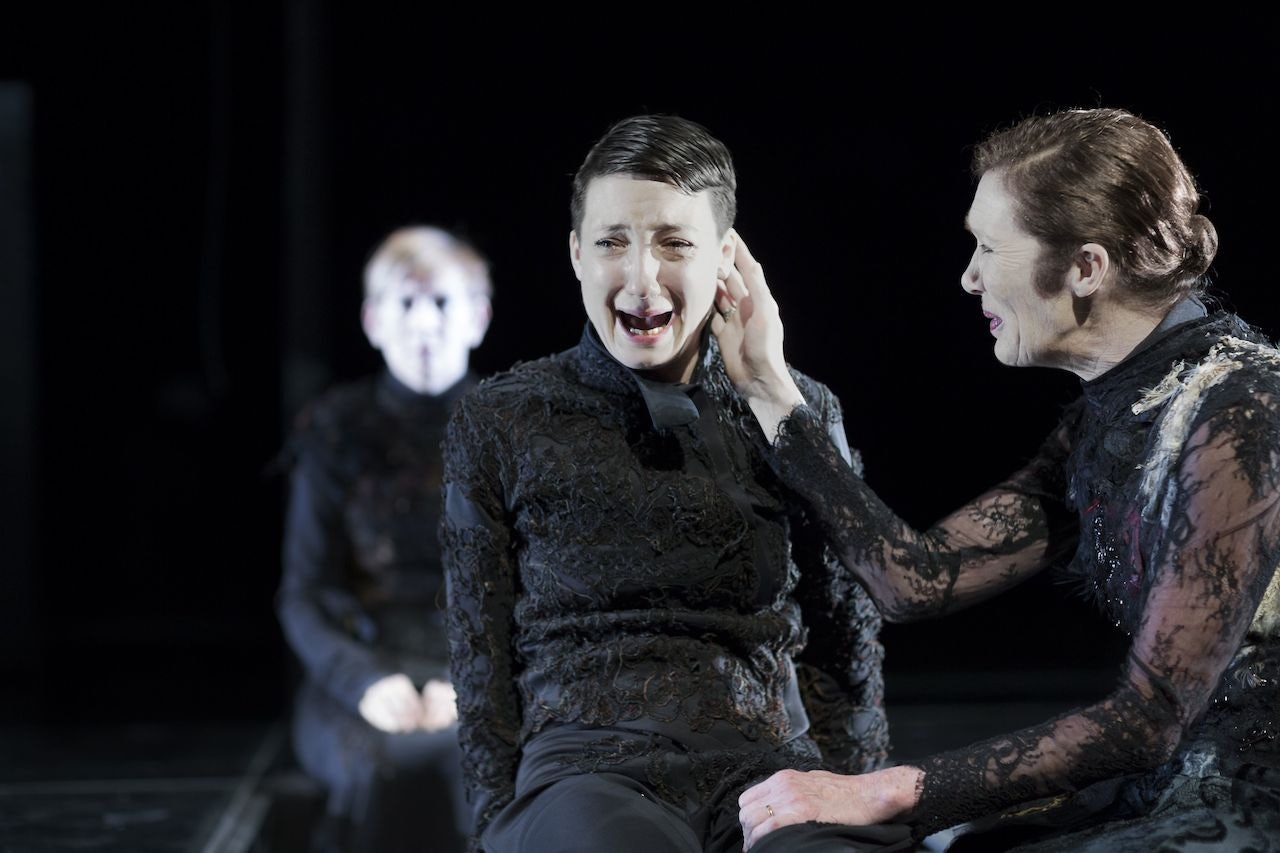
Tom Lanoye – poet, novelist, playwright and performer of his own pieces – is not the only (Flemish) writer to rework and update the classics. Adapting myths and stories into theatre is something of all times and cultures. The ancient Greeks were at it, and Shakespeare too often drew inspiration from existing narratives. Topical adaptations are intrinsic to theatre as an artistic discipline. After all, theatre is an art of the here and now: even when theatre makers do not update an old play, the audience will still experience, analyse and interpret it from their own particular here and now.
Having established this, it is interesting to look at the Flanders of yesteryear but above all at that of today. Of course, some writers turn for their material to the world classics, from both the theatre and prose canons. Many authors not only write, but are also affiliated with companies as theatre makers, actors, directors or dramaturges (not a new phenomenon; Shakespeare did the same back in the day). Others write their plays in collaboration with a group. And a noticeable development in recent years is the excellent harvest of children’s and YA theatrical texts.
then
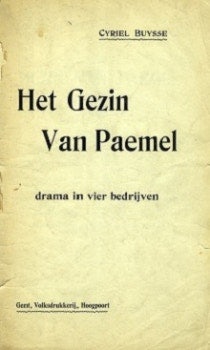
Let’s take a quick look at the past first. Until recently, Flanders had no theatre repertoire to speak of. A few miracle plays, courtly plays and farces have come down to us from the Middle Ages, but unlike its northern neighbours the Southern Netherlands has never known a playwright such as Vondel or Bredero. The region of Flanders was long oppressed by foreign powers, also in linguistic matters, which prompted many intellectuals to flee – among them Bredero. The 19th century saw a gradual change: as the people of Flanders rose up against social ills and fought for emancipation, so too calls for the right to their own language became progressively louder.
Nonetheless, Flanders had to wait for a notable play until Cyriel Buysse’s ‘Het gezin van Paemel’ (The Van Paemel Family, 1903): a social drama about poverty in rural Flanders around 1900. In the French-speaking part of Belgium meanwhile, Maurice Maeterlinck received more artistic recognition with his stage plays. In fact, he is the only Belgian ever to have won the Nobel Prize for Literature.
For the theatre in Flanders – and elsewhere in the West – the first half of the 20th century was a period of innovation. Herman Teirlinck played a key role in this process in Flanders by establishing an acting school and writing several expressionist stage plays.
post-1945
There is no expansion of the Flemish repertoire to speak of until after World War II. Flanders’ best-known playwright is Hugo Claus (1929 – 2008), who in addition to his many novels, poems and essays wrote no fewer than 70 (!) plays. Literature-loving Flanders still bemoans the fact that he was never awarded the Nobel Prize. And on top of everything else he was also a decent painter and a film and stage director.
Flanders’ best-known playwright is Hugo Claus (1929 – 2008), who in addition to his many novels, poems and essays wrote no fewer than 70 (!) plays.
Claus’ first play was ‘Een bruid in de morgen’ (A Bride in the Morning, 1953), a morality tale about incest and suicide, which came in for intense criticism from Catholic circles. Another play on the theme of incest, ‘Vrijdag’ (Friday, 1969), was an instant hit and is still frequently staged. Claus also adapted plays by Sophocles, Shakespeare, Beckett and Seneca. The goriness of Seneca’s plays and Antonin Artaud’s Theatre of Cruelty both suffuse his work. His raw depictions of a Flemish petty bourgeois milieu boast a compelling literary style and sparkling dialogue. His work is about Flanders, yet universal at the same time. Claus was the first Flemish author who made it as a playwright and managed to carve out a place for himself on the world stage as well.
Tone Brulin was similarly inspired by Artaud. ‘De Hond’ (The Dog, 1968) was an anti-apartheid play, followed later by works with African, Asian and Surinamese influences with TieDrie (or the Theatre of the Third World in Europe). From the seventies onwards, Walter Van den Broek also penned socially and politically engaged plays. ‘Groenten uit Balen’ (Vegetables from Balen, 1972), for instance, deals with industrial action and its consequences for two working-class families.
Alongside the aforementioned Tom Lanoye, Flanders has had a wealth of other playwrights since the 1990s. This can be attributed to the region’s flourishing theatrical culture and its high artistic quality. Most of the plays by the authors named in this article are stories about the condition humaine, about the meaning of life, conflict and the struggle of rebel man, if only his fight against mortality, his revolt against the reality both inside and outside of himself.
authors and companies
Flanders has a few playwrights who are not affiliated with a company, including Paul Pourveur, Bruno Mistiaen, Peter Verhelst and Elvis Peeters. Among them is also Johan Boonen, who has updated numerous plays by the three major Greek tragedians in a concrete and direct way, making these translations reflections on our present day.
However, most authors who write both novels and theatre texts tend to be commissioned by a company or theatre maker or are theatre makers themselves and directors of their own plays. Tom Lanoye, for instance, frequently writes for Guy Cassiers’ Toneelhuis, Jeroen Olyslaegers (winner of the Fintro Literatuurprijs 2017 for his novel ‘Wil’) produced the text for Jan Fabre’s 24-hour ‘'Mount Olympus. To glorify the cult of traegedy’(2016), Pjeroo Roobjee did an adaption of a fragment of ‘Faust’ in his inimitable style full of meandering sentences, while Erik Vlaminck has staged several of his own novels.
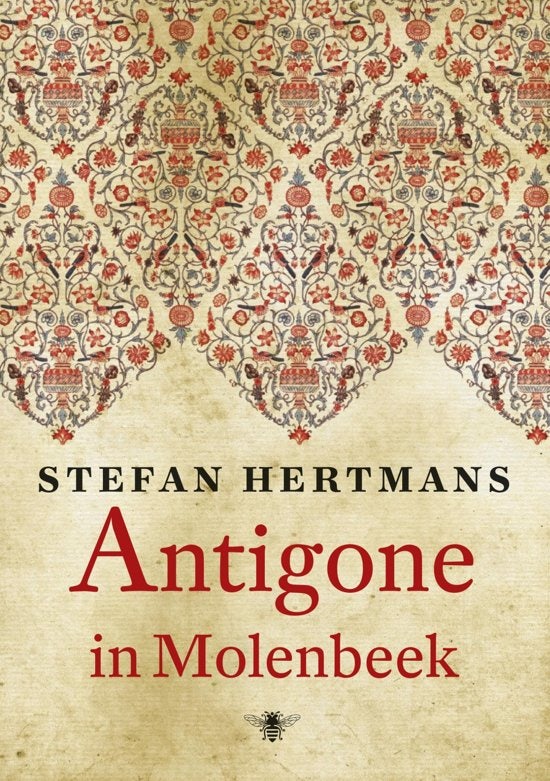
The examples are many and varied. At the same time, quite a few authors find their way to the theatre from other genres. For example, after the musical production ‘Die Siel van de Mier’ (The Ant’s Soul, 2004) in collaboration with Josse Depauw, author and cultural historian David Van Reybrouck wrote the plays ‘Missie’ (2011) and ‘Para’ (2016), in which he gives a voice to a missionary and a career soldier respectively. The two monologues were smash hits. Stefaan Van Brabandt, philosopher and erstwhile theatre maker, is currently working on a series about philosophers. He has already let Socrates and Marx speak out about our time and world in fascinating, evocative monologues. Paul Verrept’s oeuvre, meanwhile, stands out for its aesthetic, narrative texts with drawings and other illustrations, and while these can be read as novellas they have also been staged with music and narrators. With ‘Daar gaan we weer’ (Here we go again, 2018), celebrated short-story writer Annelies Verbeke has made light-hearted theatre about hot potatoes such as racism and sexism. Stefan Hertmans, feted for his novel ‘Oorlog en Terpentijn’ (War and Turpentine, 2013), takes the updating a step further: in response to recent events, he wrote an adaptation of Greek drama ‘Antigone’. The monologue ‘Antigone in Molenbeek’ (2017) is set in the present and features suspected jihadists, widespread fear and Islamophobia in the Brussels district that has gained a bad reputation as a breeding ground for terrorism in recent years.
writer-makers
Many Flemish theatre makers write their own texts for the plays they direct or perform in. Jan Decorte has been making his idiosyncratic versions of the classics for years, from the ancient Greeks to Shakespeare and Goethe. He translates and adapts them, paring them right down to their core, cloaked in an idiom of invented words and strange noises. Theatre maker Josse De Pauw has written quite a few pieces of youth theatre and musical theatre, both for himself and others, all of which are characterised by a highly personal and social slant. Starting from a gentle, humanist view of mankind, Filip Vanluchene has given ordinary people a platform for their stories. And for many years, Dimitri Leue was the in-house author and theatre maker at children’s and youth theatre company Het Paleis.
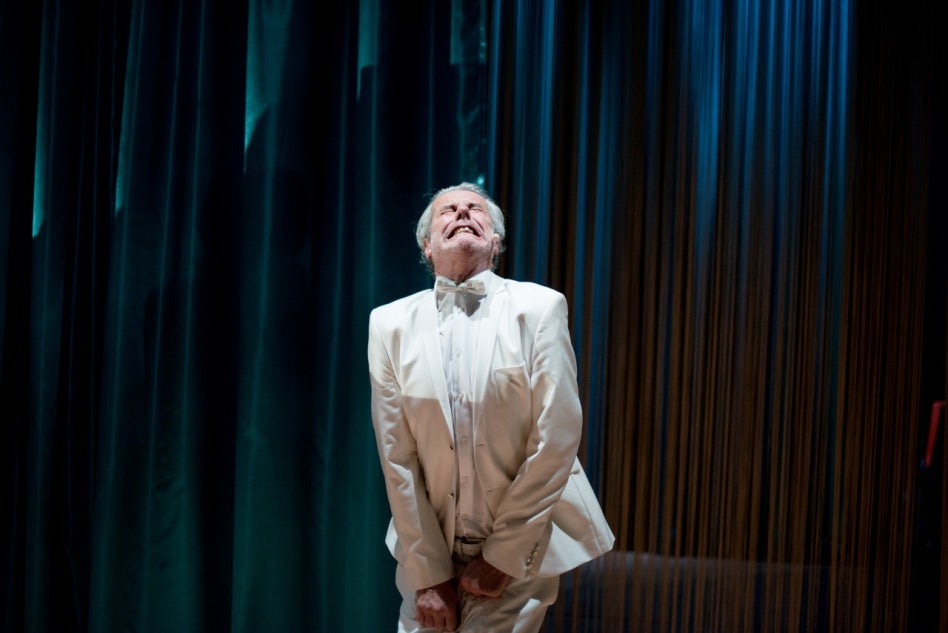
Peter De Graef likes to tell long, detailed stories about people who are damaged in one way or another. He performs his own monologues, although in some plays he engages in a dialogue with kindred spirits. Stijn Devillé often addresses social and political issues, as he does in his trilogy ‘Hebzucht’, ‘Angst’ and ‘Hoop’ (Greed, Fear and Hope, 2012/2013/2015). The overarching theme of his play ‘Groupe Diane’ (2017) is terrorism. His associates at Het nieuwstedelijk are writers too: Christophe Aussems creates plays about major local events, whereas Adriaan Van Aken likes to reflect on melancholy, with or without a copy of Willem Elsschot in hand.
The themes of all of these plays range from historical and political to personal and existential – and everything in between. Benjamin van Tourhout (Nunc) devised an entire series around the controversial Pope Borgia. Valentijn Dhaenens (Skagen) produced an internationally lauded compilation of speeches and political rhetoric as well as a haunting text about the fortunes of a soldier in the Great War. In contrast, Abke Haring (ex-Toneelhuis) never strays far from her own experiences and the theme of man’s perennial doubt in her intimate productions, while Tom Struyf likes to balance on the knife-edge between real and unreal. Among the promising young authors we find the likes of Rachida Lamrabet, Fikry El Azzouzi and Michael Bijnens.
playing together, writing together
A stage play does not always originate (entirely) in a writer’s head. Some theatre makers engage their actors in long improvisations before distilling a text from these sessions. This is something Eric De Volder did with his company Ceremonia. A few months before his sudden death in 2010 his collection ‘De Volder in stukken. Toneel 1988-2010’ (De Volder in plays. Theatre 1988-2010) was published, featuring a total of 22 plays. He based his vernacular theatre on material from found diaries, letters and notes and showed catastrophes on a human scale in his distinctive expressionistic language and performance.
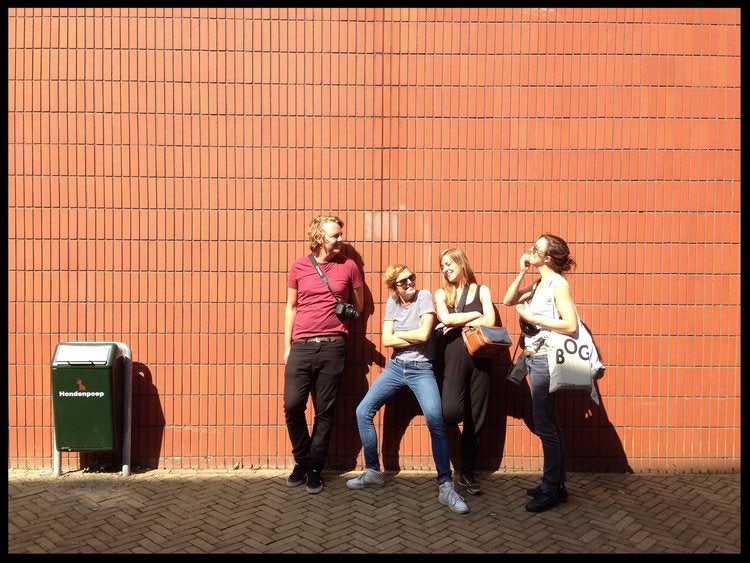
Likewise, Arne Sierens works primarily with the people around him, which usually results in poignant, sharply funny theatre around figures who are trying to stay alive on the fringes of society.
Lazarus (with the likes of Günther Lesage and Joris Van den Brande), Hof van Eede (featuring Ans and Louise Van den Eede and Wannes Gyselinck), BOG and NweTijd (with Freek Vielen and Rebekka de Wit among others) are all companies that write as a group. Their actors play both a character and themselves, using words and performance to explore the fine line between fiction and reality, whatever the latter may be. The process yields gems of incisive, philosophical, nuanced and rebellious theatre: human existence in all its multifaceted glory.
the canon on stage
The adaptation of the literary canon into theatre is something of all times and all cultures, but it is becoming increasingly common in Flanders lately. Major ensembles and theatre companies are adapting novels from both the classic and contemporary canons, from both Dutch-language and world literature, for the stage. Today’s theatre repertoire appears to be too small to keep a finger on the pulse. Guy Cassiers (currently Toneelhuis) and his team have already adapted Marcel Proust’s ‘A la recherche du temps perdu’ and Robert Musil’s ‘The Man Without Qualities’. But it is not just major companies such as the Toneelhuis, NTGent and Needcompany that tackle such adaptations, medium-sized and smaller companies do too. Novels in the canon by the likes of Camus, Coutzee, Houellebecq, Juli Zeh, Alfred Döblin, Kafka, Dostoevsky and other Russians, Philippe Claudel, Willem Elsschot, Tommy Wieringa, Toon Tellegen, Stefan Hertmans and others have already found their way to the stage.
for children and young adults
Flanders boasts captivating and high-quality theatre for children and young adults. Most of the texts are home-grown, with some based on the classic theatre repertoire or gripping (young adult) novels. Many of these texts have been collected in the series ‘Klein Magazijn’ published by Bebuquin.
Two stand-out names are Freek Mariën and Carly Wijs. Mariën’s plays are abstract, absurdist, multi-layered and written in a distinctive poetic style. In 2012 he won the KAAS & KAPPES prize in recognition of the best young adult theatrical text from the Dutch and German speaking territories, and in 2015 he received the Taalunie Toneelschrijfprijs (since 2018 known as the Toneelschrijfprijs), an annual award for the best stage play in the Netherlands and Flanders.
In ‘Wij/Zij’ (Us/Them, 2014), Wijs gives voice to two children who have survived a siege at a school in Russia. The result is a moving play for both young and old about pain, fear and the imagination. Likewise, Dimitri Leue, Hanneke Paauwe, Tom Dupont, Jo Roets, Gerda Dendooven, Jan Sobrie, Dahlia Pessemiers-Benamar, Bart Moeyaert and others surprise audiences of all ages.
In short, a great deal is written and performed in Flanders these days. The region’s high level of acting, design and staging have also met with recognition and critical success internationally. Flemish theatre offers great variety and artistic quality – and this is true both for the performance onstage and for the texts themselves.
Text by Tuur Devens
Many of the texts by the playwrights mentioned in this article have been published by De Nieuwe Toneelbibliotheek, Bebuquin or by the companies themselves.
